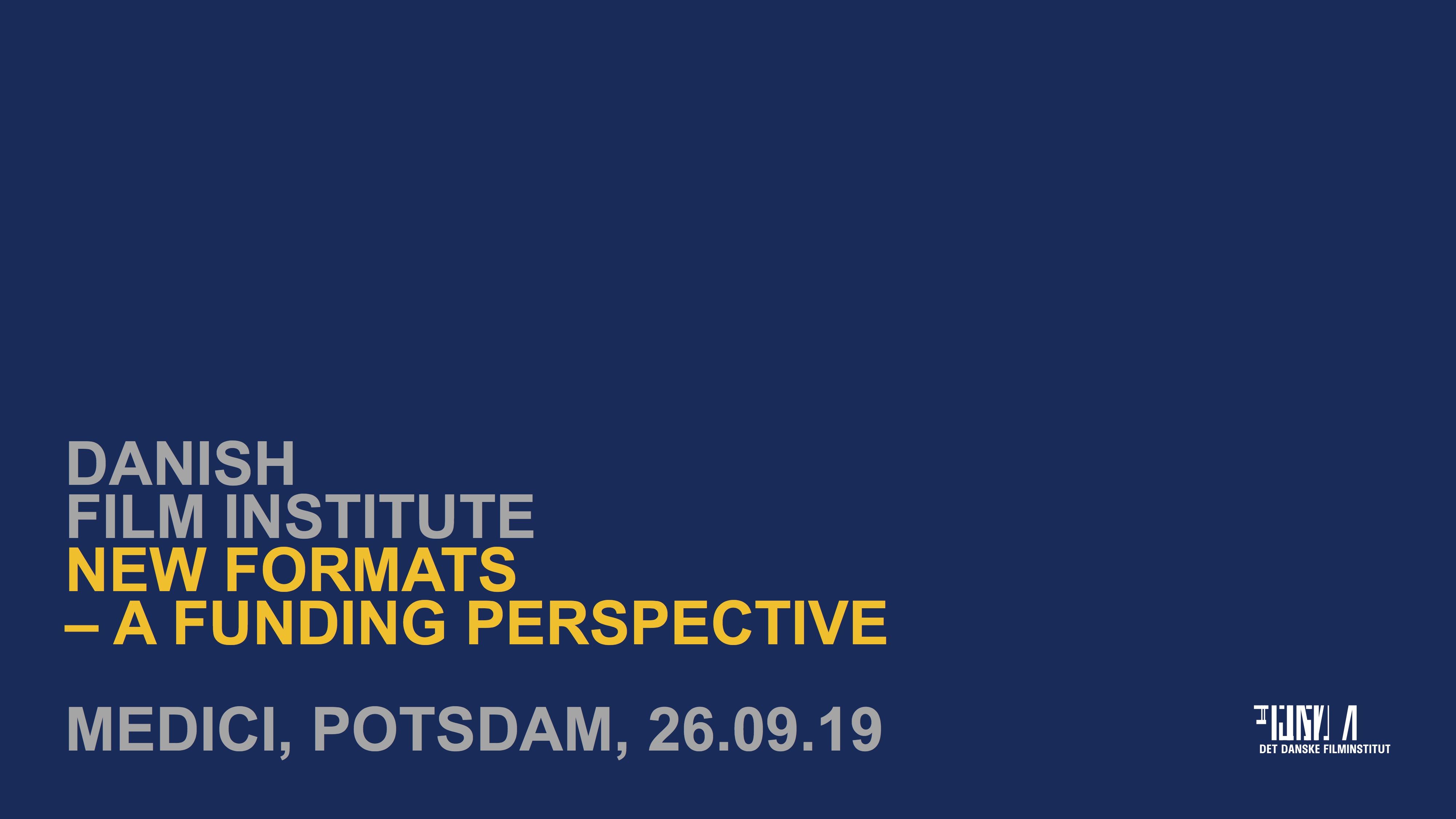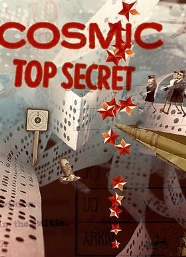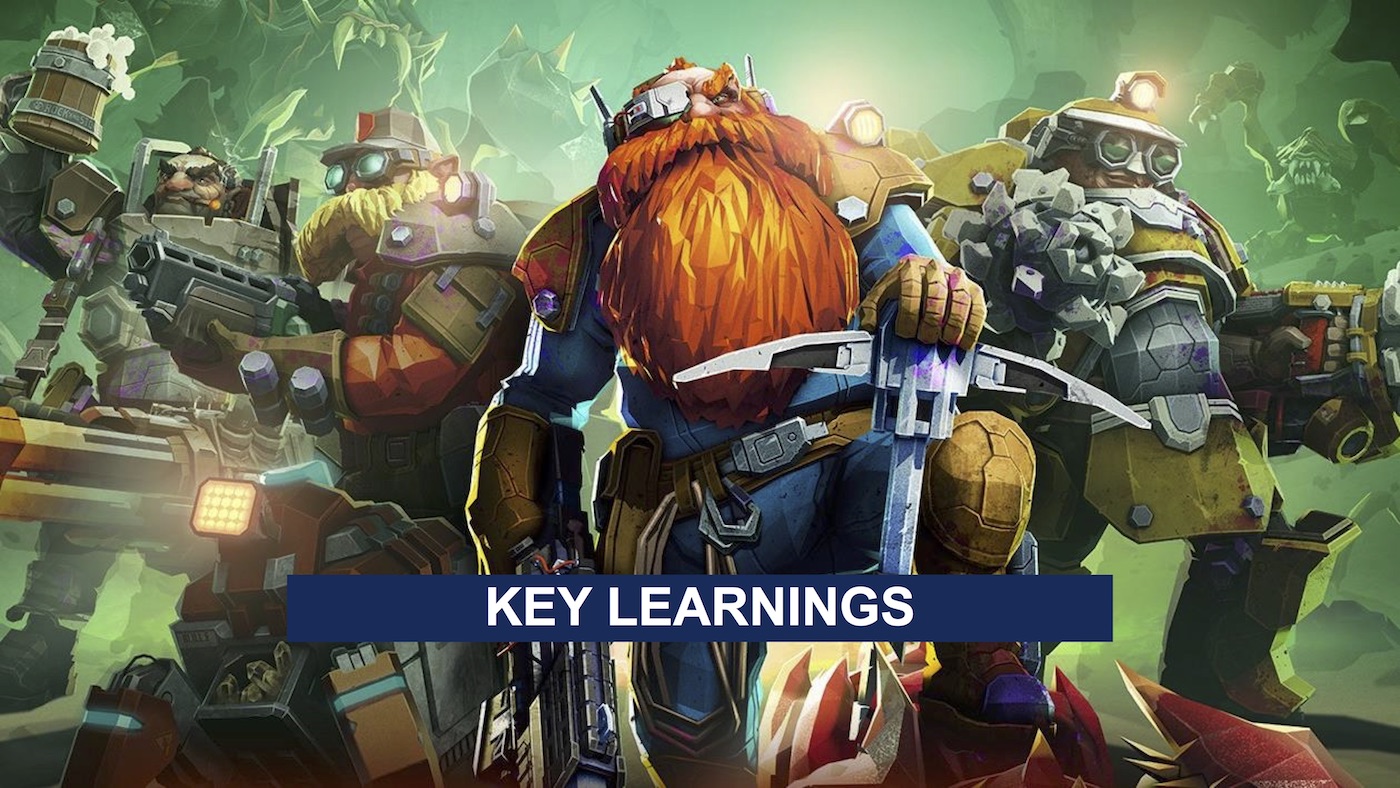Reports Previous Workshops
Ninth Workshop – 25 to 27 September 2019 in Potsdam, Berlin
Module 2.1: New Formats
Introduction
As we shift from linear programming in cinemas and broadcast to catalogue-based media on platforms, defining and designing the format to reach out to a global audience has become integral part of the content development process. The following questions arise in this context.
- How does this change the development process?
- What viewing habits must be taken into consideration – screens, locations, duration, 2nd screen activity?
- What exactly do “designing for the binge” / “integrating social media strategies” / “acknowledging the long tail” mean?
- Are there any common definitions that public funds could use to differentiate between new forms of content?
- Why do we now need to design formats?
- How do format and content development interlace?
- What parameters do we need to consider when we define a format?
- What work stages are part of format design? How do we research what format to develop?
- When do we begin defining a format?
- When should we be done with formatting?
- What skills are needed to facilitate and what criteria are needed to assess the development and production for platforms?
Some film funds in Europe have already adapted their strategies and opened up their financing schemes to transmedial and new media projects in development and/or production. The Danish Film Institute is one of the most active funds in this regard. Claus Ladegaard, CEO of the DFI presented during the 9th MEDICI workshop how his fund supports the creation of relevant and accessible content. The following section is a summary of his presentation.
Lecture and Q & A
Claus Ladegaard, CEO, Danish Film Institute
(see PDF)

At the Danish Film Institute (DFI), when we talk about the new formats, we exclude television shows and series already covered by the television support scheme. DFI could introduce a very liberal cross-media support scheme because of the Danish Film Act from 1994:
- does not only stipulates that the goal of the DFI shall be promotion of film art and film and cinema culture in Denmark,
- defines film very broadly – as motion pictures of any kind irrespective of the mode of creation or use, including photographic images and videograms, with the exception of television broadcast. This covers all kind of moving imagines except for traditional television.
The DFI’ strategy behind the cross-media scheme is identical to the strategy behind all other schemes – to strengthen the cultural impact of Danish films. All projects we support should address the issues Danes are concerned with. They should be films for ourselves made by ourselves, that will help people deal with and understand difficult things in the Danish society. Integral part of this strategy is the adaptation to the digital transformation – funding content in all formats and on all platforms that the Danish audiences are using. In addition, we are also trying that the projects we finance reflect a diversity in every way.
DFI’S SUPPORT SCHEMES FOR DIGITAL MEDIA
1. Digital Games Scheme
- The DFI started supporting digital games in 2007 with a tiny budget (800.000 Euro) within the support scheme New Danish Screen. The support started at the initiatives of the politicians who thought that games are close to films and can be also important cultural products. The scheme aimed at new talents and was supposed to provide a sort of the seed money for new producers. The target groups considered were only children and youth.
- The scheme lasted for eight years until DFI established a specific funding scheme for digital games in 2015 after approval by the EU that games can be treated as cultural projects and after we convinced the politicians that games are for everyone, not only for children and youth (as the conducted surveys showed). The scheme is dedicated to development, production and promotion of games and operates with around 2 million Euro a year.
- The criteria the scheme is based on are:
- cultural value (aesthetic qualities, educational potential, social engagement and relevance for Danish audience),
- originality (different from the existing games in the market),
- feasibility and
- responsibility (transparency in payment, legal handling of personal information and social responsibility in communication between players, etc).
- What is specific about the games is that they are 100% international in their reach, whereas films are 100% national.
The representative examples of the videogames supported by the DFI include:
Cosmic Top Secrets

- Adventure game with autobiographical and documentary elements.
- The character must find the truth about her parents who were secret agents during the cold war.
- An extension of a documentary film on the same subject.
- DFI supported it with 430,000 Euro for development and production, which makes 48% of the global budget.
Mulch

- Educational game for kids attending 7th - 9th grade, to be played in the classroom.
- The players have to manage the production on a farm with animals and crops.
- 77,000 € in development and production funding, 20% of the budget. The rest was secured through equities by farmers’ associations and NGO’s working with environmental issues.
Inside

- Artistic puzzle platform game for a grown-up indie game audience. It is extremely well done aesthetically and artistically.
- The player has to get a boy through a dystopic and dangerous world.
- 135,000 € in development funding, 1.3% of the budget. It had a huge international potential and attracted a lot of international financing. Probably today we would not fund this company anymore. When we funded it, it was their second game and we gave them some development funding, which helped them to keep the rights and go on with the financing process. Now that they are successful we would probably let them do everything by themselves.
- Winner of 4 Bafta Awards.
2. The Cross-Media Development Scheme
- It started in 2015, when the DFI established the Game Scheme and stated exploring the links between games and films. We introduced first the Cross-Media Development Scheme. It covered productions made in more than one form and intended for more than one platform. We are very broad and inclusive when it comes to eligibility of projects. The only requirement is that moving imagines must be part of the project, meaning that it cannot be only a book or a podcast. The scheme’s budget was 400.000 Euro with an editorial board of film and game commissioners employed at the DFI. We also had an additional objective with this scheme: to gain knowledge about handling cross-media project because we were lacking experienced knowledge.
3. Cross-media funding within all schemes
- This year, however, the DFI has closed the Cross-Media Development Scheme and changed the funding regulations so that producers can apply for cross-media funding within all schemes, not just one specific scheme. It means that producers can apply for a game and a feature film support in both game scheme and commissioner’s schemes for feature films and documentaries. The budget is flexible and since 2019 it has been part of the total DFI’s budget.
- The funding criteria include:
- Originality: new and original elements in form, content, expression or storytelling and a distinct and coherent voice of the creator.
- Expansion: the universe or the storytelling is expanded and enriched by the use of more than one format, which is the most important aspect for us.
- Connection: the connection of the different elements and formats and their ability to express the vision and the controlling idea of the project.
The representative examples of the cross-media projects supported by the DFI include:
Flee
- Animated feature-length documentary film and immersive VR project.
- The film and the VR experience tell the story of Amin and his five-year long journey from Afghanistan to Denmark as a refugee. VR experience covers only one scene to make spectators feel how it is to be a refugee and travel on such a long journey.
- 41,000 € in development funding.
- Still in development.
Vokabulantis
- Episodic and interactive cross-media story combining puppet film and digital game.
- The story follows two tweens who want to talk about their feelings towards each other, but have to learn a special language for it.
- Spectators will find it fun to learn the language skills. Aimed at tweens.
- 75,000 € in development funding.
- In development.
Sein
- Cross-media interactive youth universe on the website www.seinmag.dk.
- Includes text, sound, video in different genres, e.g. fiction and documentary web series.
- Curated and produced by an editorial board of youngsters.
- Target group: 15-25-year old people
- 360,000 € in development and production funding. It is a huge support from the DFI. The website is running right now and we hope they will find the sources to keep it running because the DFI will not be able to fund it substantially in the future.
4. Call “Universe”
- Is a call for cross-media projects for children.
- Purpose: to stimulate the development and production of content for children combining storytelling in traditional formats and in new formats.
- Distribution: combining traditional platforms and new platforms.
- Target group: children under the age of 12.
- A project has to include minimum two formats.
- Only creatives and companies with a proven track record can apply.
- Encourage collaborations between creatives and companies from different formats and platforms.
- 40 applications.
- Development funding up to 33,000 €.
- Funding of 7 projects for development.
- 3 months to conclude the first development.
- Applications for additional development or production funding.
- Budget: to be decided.
KEY LEARNINGS FROM TO-DATE EXPERIENCE WITH FINANCING NEW DIGITAL FORMATS

- New formats are very different from films in terms of storytelling, financing, development, production and perception.
- Films, and the way we develop and fund them, are well defined - new formats are not. We have a very elaborate development scheme (with specific and clear development phases) when it comes to film funds. It includes Idea, synopsis, treatment, 1st draft, 2nd draft … shooting draft, of the script, project development, pre-production, production, post-production, promotion, distribution. With new formats it is so different because they go back and forth within the value chain, there is no linear and predictable process.
- Film funds need to accept the new reality and reform their regulations accordingly. In the beginning many people at the DFI were frightened. They did not know what to do, but it is getting better with time.
- As for the staff, the traditional film people are not enough anymore. We need to recruit staff from the game industry and other areas related to new formats.
CHALLENGES
- What shall be the role of the fund? Should they stick to films, open up the funding systems to new formats, or make cross-media a requirement? Indeed, there are funds such as Canada Media Fund that support cross-media projects only.
- How to get the most innovative and professional part of the film industry to engage in cross-media? The problem is that that the industry still sticks to feature films and TV series and never goes to cross-media.
- Opposition from a conservative film industry. They feel that the public funding will decrease or be redirected to the cross-media people.
- How to fund new formats without extra funding allotted to the film fund?
- Finding the right balance between abolishing old formats and embracing new ones. Our debate at DFI involves the following questions:
- Should we stop funding short fiction for the sake of funding for web-series and low-budget features?
- Should we fund children’s films or digital games? We still invest much more funding in children’s films. But in the future, the funds will have to move here as well.
- Should we fund youth films or serial fiction? SKAM is a great example. If it had been made as a feature, nobody would have ever noticed it (even in Norway). It is the format that made this series successful. So serial fiction is much more important for the younger audience than youth films.
- What should be the balance between traditional feature projects and interactive projects.
THE FUTURE PLANS
- Higher priority to the digital perspective: digital games, cross-media and serial storytelling.
- 2018: less than 5% of the overall funding budget went to games and cross-media. It will increase!
- The funding system needs to adjust - flexibility and less detailed regulation! So that we can follow the digital transformation and development.
- Content must take priority over format - and platform! The main driver is the storytelling.
- Let’s stay relevant! We should look at what public service broadcaster and gamers are doing in order to stay relevant for the children and youth.
- It is not only children who are leaving the old platforms, it is also much older people in Denmark. The fund should address these age groups as well.
Q & A with Claus Ladegaard
- Did you receive money from the Danish government to implement this cross-media turn? And how are you communicating to conservative feature-film producers this new trend?
- CL: The change is still not too radical. We allocate only 5% of the fund to the cross-media, so we do not need additional approvals and financing. Our strategy is to convince film producers that it makes sense to do games, web-series etc. in combination with films. But they are still too conservative, their motivation to change is still low and they are afraid that in the future they will lose the schemes for financing feature films.
- Do producers at the moment of applying need to have a clear idea about the formats the want to use in cross-media projects?
- CL: We only require that every application contains a visual element. Also, we encourage producers to come to us very early – in the pre-development process – before they decide on the formats, so that we can help them in choosing the right ones that expand the story. If they come after they decided on everything, then it does not work.
- How does the distribution of cross-media projects work?
- CL: We still lack a concrete business model that would ensure revenues for cross-media projects. The web-series we have funded are distributed on YouTube and nothing happens. They are 100% publicly funded. It is still much less income than in case of feature films, games and TV.
- Do people make applications together (cross-media and classic producers) or is it film producers as “usual suspects” who apply through their established companies?
- CL: We are quite open. It can be either of the two companies that receives the funding. We have a tradition that the applicant opens a single-purpose company and applies for funding, which can work here as well.
- Do you organise match-making events where people from different sectors can meet up and learn about each other’s practices and vocabulary?
- CL: We do not do it in a systematic way within Denmark, because it is a small country where feature film producers can easily get an overview of all available partners for cross-media projects. They do match-making themselves when they need each other as well as the Creative Europe Desk. We occasionally organise workshops and seminars, and maybe we should do more of that in the future. However, we are more active with match-making when it comes to international collaboration. We started co-operation with the Canada Media Fund and organized match-making talks with them. The Canadian industry is much more developed in terms of technology and audience research. The DFI signed the digital media co-development agreement with them three years ago. We identified producers, directors and creators who could be interested in collaboration of this sort and organised a match-making event with Canadians. As a result, we had 2 rounds with 10 applications. Four projects were selected in each co-development call, and three of them have moved to production. Our initial goal was modest – only to get a chance to tap into the knowledge of the Canadian fund, without expecting that our collaboration would result in actual projects. But in the end, we also have some productions, which is fantastic considering the small pool of Danish producers active in this area.
- What are the experiences of other film funds with cross-media schemes?
- CL: The Norwegian Film Institute has the support scheme for games that they opened at the initiative of the Norwegian Ministry of Culture. It was fascinating to find out that in Norway the primary game consumers are women in their 40s. There are also significant developments in Flanders. There they organise lectures and masterclasses by international experts, international story-telling conference where people representing different types of sectors and formats participate in order to inspire people to be more collective. In Germany, the game schemes are under the competence of regional film funds, not the federal film fund.
The public film funds’ experiences with new players and forms of content, their impact on funding schemes and their responsibility towards the industry in the 21st century
- Module 1 – Platform Economy
- Module 2.1 – New Formats
- Module 2.2 – Group Exercise: Format Development
- Module 4.1 – Digitisation From Application to Distribution
- Module 4.2 – Blockchain as a part of the workflow
- Module 4.3 – Group exercise: block chain as part of new funding schemes. Supporting new formats and platform distribution
- Module 5 – Sustainability: Surviving the 21st Century
- Module 6 – Free Flow: What Do You Think?